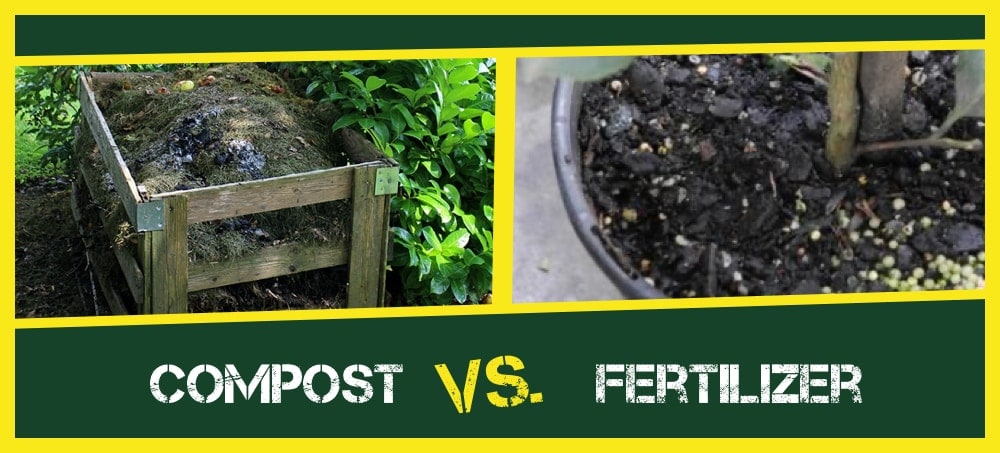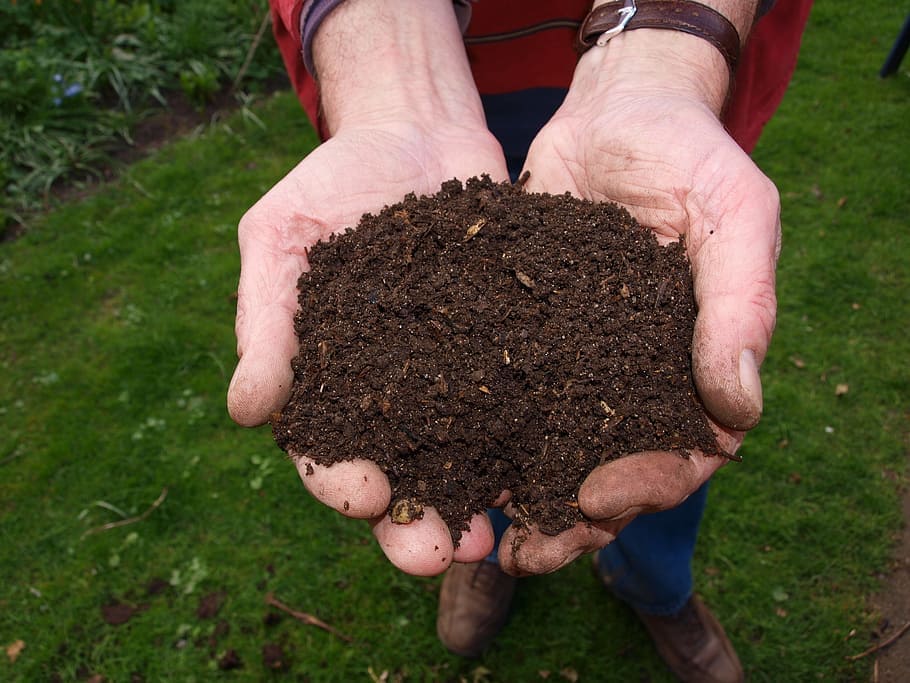Compost vs. Fertilizer: What’s the Difference?
-
Pete Ortiz
- Last updated:


In this article, we break down these two methods of encouraging better plant growth. We’ll also highlight each one’s benefits, as well as issues to avoid.
Knowing when to use compost and when to apply fertilizer can go a long way toward creating a healthy, prolific garden.
Compost

Made from organic material, many people tend to call compost “black gold” because of how well its nutrient-rich properties promote soil health and plant growth. You can buy it, but if you choose to make your own compost, you’ll being recycling what would have been trash and transforming it into valuable gardening material.
Compost consists of grass clippings, fallen leaves, vegetable and fruit peels, stems, seeds or pits, coffee grounds, eggshells, and other similar organic waste. Usually assembled in a specialized bin, a healthy compost pile maintains a working balance between carbon-rich materials and nitrogen or protein-based matter. Over time, as you layer, moisten, and turn your compost, microbial and bacterial processes break it down into a usable consistency. Once it’s ready, you can mix your dark, rich compost into your garden.
The addition of compost enriches your soil, which in turn, improves the overall health of your plants by promoting root growth and warding off disease. The positive effects continue long after you’ve tilled the compost into your garden. The ongoing decomposing process provides a steady supply of nutrients, as it creates antibodies and a symbiotic relationship with the soil. Plus, most compost contains good bacteria and helpful fungi in addition to earthworms and dung beetles that help aerate the soil.
One word of caution. Rotting materials in your compost can grow harmful fungi too, which can be dangerous to inhale. Also, the process of decomposing can, under certain circumstances, create a combustion risk. Be sure to learn as much as you can about the proper techniques for making your own compost, including what should and should not be added. On a lesser note, the preparation required for composting may not be for everyone, as there’s an unavoidable odor from the rotting materials.
- Amends the soil
- Nutrient rich
- Helps promote root growth
- Wards off plant disease
- Inexpensive
- Decrease trash in landfills
- If not purchased, must be made
- Takes time to prepare
- Dangerous to inhale if there’s fungus growth
- Process of decomposing creates combustion risk
- Gives off a foul odor
Fertilizer
Unlike compost, fertilizer is a manufactured product that feeds plants directly. The primary use of fertilizer is to target your plants’ exact needs. In some cases, no matter how enriched the soil may be, your plants still may not be able to absorb certain nutrients. Fertilizer works quickly to improve any deficiencies by providing three major elements: nitrogen, potassium, and phosphorus. Nitrogen promotes dense, thick leaves, while potassium and phosphorous work to strengthen foliage and increase root growth.
There are many variations of fertilizers on the market to address your garden’s needs. Depending on your plant types and how long you need to maintain the benefits, you can choose between quick-release and slow-release fertilizers. Also, fertilizers can be organic, synthetic, or a mixture of both. Synthetic fertilizers are chemically manufactured, while organic versions are made from once-living organisms and their byproducts.
You can buy fertilizer in powdered, liquid, and granular forms. Liquid and powdered fertilizer must be mixed with water in either a spray bottle or with a hose attachment and must be applied often. Granular fertilizer can be distributed by hand or with a spreader.
There are a few drawbacks to using fertilizer. If you’re environmentally minded, you’ll likely want to avoid using most fertilizers, particularly synthetic varieties, as they pose the risk of run-off, resulting in nearby water contamination. Another potential problem is the unfortunate risk of overapplication, which can burn plants and cause extensive damage or even kill them. Finally, you need to consider your budget when electing to use fertilizer. Treating large areas and having to do multiple applications can add up.
- Feeds plants directly
- Targets plants’ exact needs
- Can improve specific nutrient deficiencies
- Quick to help plants grow and produce
- More expensive
- Overapplication can damage or kill plants
- Run-off may contaminate water sources
In Conclusion
When deciding between compost and fertilizer, consider the main difference between these two methods for improving the health of your garden. If your intention is to enhance the quality of your soil for better growing conditions, then compost is your best choice. However, if your plants are lacking in nutrients and having difficulty absorbing what they need, then you’re better off applying a fertilizer. As we stated, make sure to follow the proper methods for either preparing compost or applying fertilizer to avoid potential risks and problems.
We hope we’ve helped you make an informed decision when choosing between compost and fertilizer to give your garden a growing advantage. With the right application of either product, you won’t have to wait long to see the positive results.




